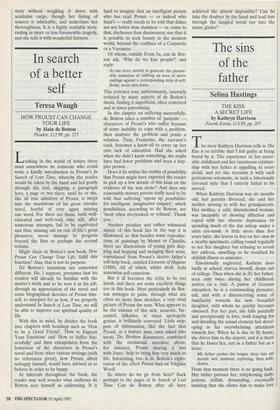In search
of a better self
Teresa Waugh
HOW PROUST CAN CHANGE YOUR LIFE by Main de Botton Picador, £12.99, pp. 215 Lurking in the world of letters there must somewhere be someone who could write a kindly introduction to Proust's In Search of Lost Time, whereby the reader would be taken by the hand and led gently through the text, skipping a paragraph here, a page or two there, until he or she, like all true admirers of Proust, is swept into the maelstrom of his great circular novel, fearful of ever again missing one word. For there are those, both well- educated and well-read, who still, after numerous attempts, fail to be captivated and thus, missing out on one of life's great pleasures, never manage to progress beyond the first or perhaps the second volume.
Might Alain de Botton's new book, How Proust Can Change Your Life, fulfil this function? Alas, that is not its purpose.
De Botton's intentions are somewhat different. He, I suppose, presumes that his readers will already be familiar with the master's work and so he sees it as his job, through an appreciation of the novel and some biographical sketches of Proust him- self, to interpret for us how, if we properly understand In Search of Lost Time, we will be able to improve our spiritual quality of life.
With this in mind, he divides the book into chapters with headings such as 'How to be a Good Friend', 'How to Express Your Emotions' and 'How to Suffer Suc- cessfully' and then extrapolates from the behaviour of the characters in Proust's novel and from other various writings (with no references given), how Proust, albeit unhappy himself, would have advised us to behave in order to be happy.
At intervals throughout the book, the reader may well wonder what audience de Botton sees himself as addressing. It is hard to imagine that an intelligent person who has read Proust — or indeed who hasn't — really needs to be told that dukes are not better than dustmen — or, come to that, duchesses than dustwomen; nor that it is possible to seek beauty in the modern world, beyond the confines of a Carpaccio or a Veronese.
Of whom, outside Form 5a, can de Bot- ton ask, 'Why do we kiss people?' and reply:
At one level, merely to generate the pleasur- able sensation of rubbing an area of nerve endings against a corresponding strip of soft, fleshy, moist skin tissue .. .
This reviewer was, unfortunately, intensely irritated by many aspects of de Botton's thesis, finding it superficial, often contrived and at times patronising.
In the chapter on suffering successfully, de Botton takes a number of 'patients' characters of Proust's who suffer because of some inability to cope with a problem, then analyses the problem and posits a solution. Thus, Francoise, the narrator's cook, becomes a know-all to cover up her own lack of education. Had she asked when she didn't know something, she might have had fewer problems and been a hap- pier person.
Does it lie within the realms of possibility that Proust might have expected the reader to pick up a few details of this kind on the evidence of the text alone? And does any reasonably mature person really need to be told that suffering 'opens up possibilities for intelligent, imaginative enquiry', which possibilities, according to de Botton, are `most often overlooked or refused'. Thank you.
Another peculiar and rather whimsical aspect of this book lies in the way it is illustrated, so that besides some reproduc- tions of paintings by Monet or Chardin, there are illustrations of young girls skip- ping and hopping and swinging their arms, reproduced from Proust's doctor father's self-help book, entitled Elements of Hygiene (1888). All of which, whilst droll, feels somewhat self-conscious.
But it ill becomes the critic to be too harsh, and there are some excellent things too in this book. Most particularly de Bot- ton manages to paint, through what are often no more than sketches, a very vivid picture of Proust the man. What appears to be the essence of this sick, neurotic, fur- coated, talkative, at times apologetic genius, is brilliantly conveyed. Little snip- pets of information, like the fact that Proust, as a mature man, once asked who wrote The Brothers Karamazov, combined with the occasional anecdote about, for instance, Proust sharing a taxi with Joyce, help to bring him very much to life. Interesting, too, is de Botton's explo- ration of the effect Proust had on Virginia Woolf.
So where do we go from here? Back perhaps to the pages of In Search of Lost Time. Can de Botton after all have achieved the almost impossible? Can he take the doubter by the hand and lead him through the tangled wood out into the sunny glades?


































































 Previous page
Previous page